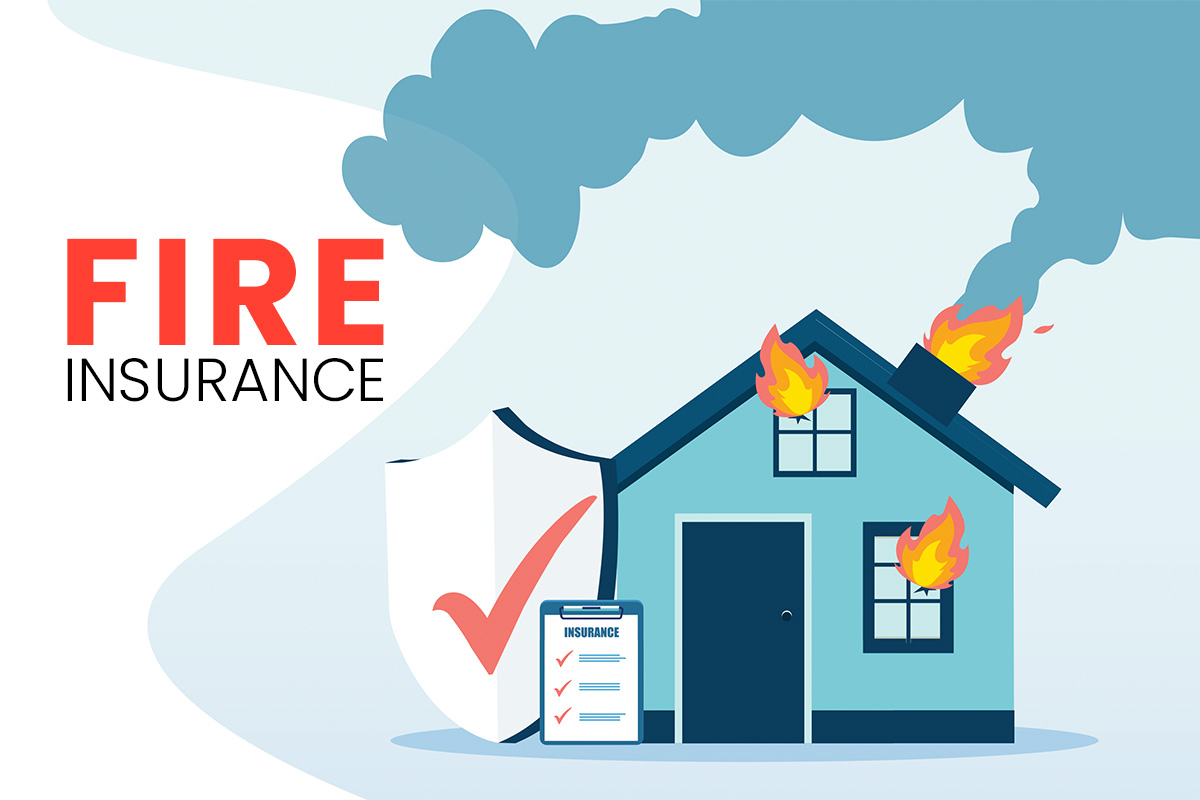
Fire insurance is a crucial type of property insurance that provides coverage against losses or damages caused by fire. Whether you are a homeowner, business owner, or tenant, fire insurance offers a financial safety net in the unfortunate event of a fire, helping you rebuild or replace damaged property. But what exactly is fire insurance, how does it work, and why is it important? Let’s dive into the details to understand its significance and how it can protect you.
1. Understanding Fire Insurance
At its core, fire insurance covers damage to buildings, personal belongings, or business assets that result directly from fire incidents. This coverage can be part of a broader property insurance policy, or it can be purchased separately depending on specific needs.
Fire incidents can have devastating consequences. In a matter of minutes, a small flame can grow into a destructive force that leaves homes, offices, and possessions in ashes. Fire insurance provides peace of mind by ensuring you have the financial means to recover after such a disaster.
2. How Does Fire Insurance Work?
When you purchase fire insurance, you enter into an agreement with the insurance company. In exchange for regular premium payments, the insurer agrees to cover fire-related damages to the property. Here’s how the process typically works:
-
Premiums: The cost of fire insurance premiums varies depending on several factors, including the property’s location, age, construction materials, and the amount of coverage. Properties located in areas prone to wildfires or with higher risks may have higher premiums.
-
Coverage: A standard fire insurance policy typically covers damages caused by fire, smoke, and firefighting efforts, as well as water damage from efforts to put out the fire. It may also cover damage from explosions that result from the fire. Policies can be customized based on additional risks and needs.
-
Claim Process: If a fire occurs, the insured person or business must notify the insurance company, file a claim, and provide evidence of the damage. The insurer will then investigate the claim and determine the amount of compensation based on the terms of the policy.
-
Reimbursement: Once the claim is approved, the insurance company provides funds to cover the repair or replacement costs of damaged property, as well as any temporary living arrangements or business interruptions caused by the fire.
3. Types of Fire Insurance Policies
Fire insurance policies can vary in scope and coverage. Here are some common types of fire insurance policies:
-
Standard Fire Insurance: This is the most basic form of fire insurance, covering losses directly caused by fire. It typically includes coverage for the building, personal belongings, and sometimes even machinery or equipment in the case of businesses.
-
Comprehensive Fire and Perils Policy: This policy goes beyond fire to include coverage for other perils like natural disasters (earthquakes, floods), explosions, or even burglary. It’s designed for individuals or businesses who want protection from a broader range of risks.
-
Standalone Fire Insurance: Some property owners may opt for a standalone fire insurance policy if they already have other forms of insurance, like home insurance, but want additional coverage specifically for fire-related risks.
-
Consequential Loss Policy: This type of fire insurance covers not just the physical damage caused by fire but also the financial loss a business may suffer due to downtime or halted operations. It can be crucial for businesses that need to recover quickly to avoid losing revenue after a fire.
4. Key Features of Fire Insurance
Fire insurance policies are typically detailed and vary depending on the provider, but most will include the following features:
-
Sum Insured: This is the maximum amount the insurance company will pay out in the event of a claim. The sum insured should be enough to cover the cost of rebuilding or repairing the property and replacing personal belongings.
-
Exclusions: Fire insurance policies come with exclusions—specific scenarios where the insurer is not liable to pay out. Common exclusions include:
- Fires caused intentionally (arson)
- War-related damages
- Nuclear perils
- Electrical short circuits, unless they cause a fire
- Damage due to terrorism (unless added as a rider)
-
Add-ons or Riders: Many fire insurance policies allow you to add coverage for additional risks. For example, you can add coverage for:
- Earthquakes
- Floods or storm damage
- Loss of rent
- Damages due to riots or civil unrest
-
Replacement Value vs. Actual Cash Value: When determining compensation, insurers will either pay based on the replacement value of the property (the cost to replace or rebuild without factoring in depreciation) or the actual cash value (the value after accounting for depreciation).
5. Who Needs Fire Insurance?
-
Homeowners: Fire insurance is essential for anyone who owns a home. Even if a mortgage lender does not require it, having fire insurance can save you from financial ruin in the event of a fire.
-
Tenants: While landlords are responsible for insuring the building, tenants can benefit from fire insurance to protect their personal belongings. A tenant’s policy can cover the cost of replacing furniture, electronics, clothing, and other possessions lost in a fire.
-
Businesses: Fire can disrupt business operations and lead to significant financial loss. Fire insurance helps businesses cover the cost of damaged inventory, equipment, and office space, while also potentially providing for lost revenue during the recovery period.
6. Benefits of Fire Insurance
-
Financial Protection: The most significant benefit is financial security. Fire insurance ensures that you don’t have to bear the full burden of repairing or replacing damaged property after a fire. In a worst-case scenario, it could mean the difference between recovery and financial hardship.
-
Peace of Mind: With fire insurance in place, you have the comfort of knowing you’re protected. Fires can occur unexpectedly, and the stress of losing property can be overwhelming. Insurance can alleviate some of that worry by offering a backup plan.
-
Coverage for Related Expenses: Many fire insurance policies don’t just cover the cost of repairing the property—they also cover additional expenses like temporary housing, storage for undamaged items, and even legal liabilities if the fire affects neighboring properties.
7. Conclusion
Fire insurance is a vital form of protection for anyone who owns or rents property. Whether you’re a homeowner, tenant, or business owner, this type of insurance provides essential coverage in the face of one of the most destructive forces—fire. By understanding the different types of policies, how they work, and what they cover, you can make an informed decision and ensure you are adequately protected.
If you haven’t already considered fire insurance, now might be the time to explore your options and find a policy that suits your specific needs.
